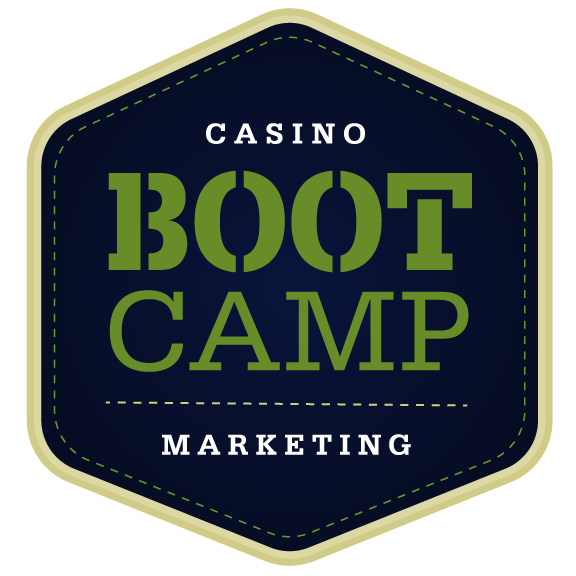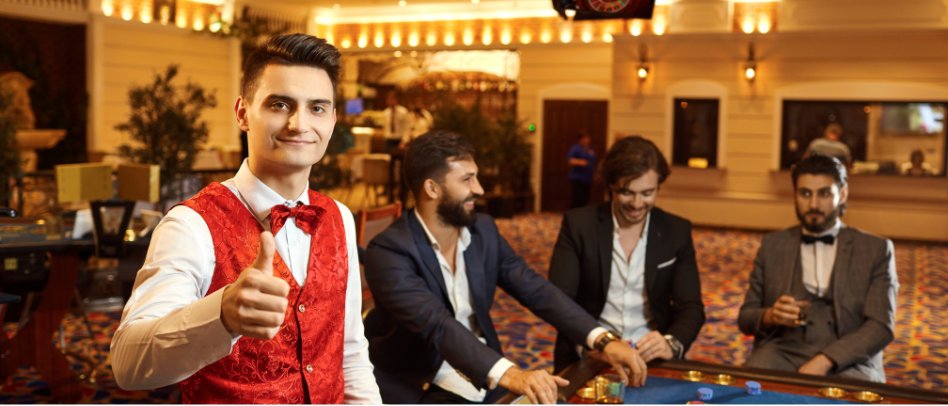In any industry, customer retention is a pivotal factor for success. It is no different for the casino industry. It may be even more critical. The thrill of the game and the allure of entertainment might draw guests in, but the quality of their experiences will keep them returning. Every detail can tip the scales between success and languishing at or near the bottom of the market. The role of marketing must extend far beyond mail, advertising, and promotions. Comprehensive casino marketing training can transform your efforts from a collection of tactics to an indispensable strategy for success.
The casino landscape is becoming increasingly competitive, with countless options for guests. In this market environment, casinos can no longer rely solely on the allure of gaming; they must differentiate themselves through the quality of customer experiences they provide. Large or small, your casino CAN create memorable experiences that will differentiate you. It is not a concept exclusive to marquee brands like Four Seasons and Disney. Like yours, their differentiation stems from how well the entire team understands and implements vital marketing principles.
Property-wide casino marketing training equips staff better to understand customer behaviors, preferences, and expectations. It goes beyond traditional marketing skills, encompassing aspects like customer service excellence, effective communication, and the ability to create personalized experiences. This type of marketing training ensures that every staff member, regardless of their role, contributes to a cohesive and appealing brand image that resonates with guests.
The Power of Comprehensive Marketing Training for Non-Marketing Employees
The notion that marketing is solely the domain of the marketing department needs to be updated, especially in the context of the casino industry. Every employee, from the dealers to the hospitality staff, interacts with guests and influences their overall experience. Comprehensive marketing training for these non-marketing employees transforms them into brand ambassadors who can effectively communicate the casino’s value proposition to guests.
By equipping non-marketing employees with marketing insights, they can understand the bigger picture of how their interactions impact customer loyalty and retention. They become more adept at recognizing customer needs and preferences and delivering experiences that meet and exceed guest expectations. This level of personalized attention can significantly enhance customer satisfaction, leading to higher retention rates and, ultimately, a more robust bottom line for the casino.
Comprehensive casino marketing training is pivotal in carving out a competitive edge in a particularly competitive market. It empowers every employee to contribute meaningfully to the customer’s journey, turning every visit into an experience guests are eager to repeat.
Beyond Traditional Marketing – Every Employee’s Role in Shaping Customer Experience
The essence of effective casino marketing lies in the understanding that every interaction with a guest is a unique opportunity to foster loyalty and satisfaction. Whether it’s a warm greeting from a dealer, personalized service from a server, or attentive assistance from a slot or EVS attendant, these moments cumulatively shape the guest’s perception and experience.
Casinos can significantly amplify guest loyalty by extending marketing training to all staff levels – including non-guest-facing employees. This training moves beyond the basic marketing principles, focusing on the nuances of customer behavior, expectation management, and the art of creating personalized experiences. Employees learn to view their roles through the lens of marketing, understanding how their actions contribute to the bigger picture of guest satisfaction and retention.
The Positive Impact of Understanding Casino Marketing Principles
A deep understanding of casino marketing principles among all staff members can profoundly influence the ease with which we can achieve business goals. It empowers employees to make informed decisions, anticipate guest needs, and proactively address them, enhancing service quality. This level of understanding ensures that each guest interaction is not just a transaction but a step toward building a lasting relationship.
Training employees to see each interaction as an opportunity to foster loyalty transforms the casino environment into a more guest-centric space. Guests feel recognized, valued, and understood – essential customer satisfaction and loyalty components. This shift in perspective changes the nature of guest interactions from mundane to memorable, encouraging repeat visits and positive word-of-mouth referrals.
Brand Consistency Across Employee Interactions
An integral part of this comprehensive marketing approach is maintaining brand consistency across all employee interactions. Consistency in service, communication, and guest engagement reinforces the casino’s brand identity and values. This uniformity not only builds trust and reliability in the eyes of the guests but also strengthens the internal culture among employees, uniting them in a common goal of delivering exceptional guest experiences.
Expanding the scope of training to include marketing training for all employees is a strategic move for casinos aiming to enhance customer loyalty and satisfaction. It ensures that every staff member, regardless of their role, is aligned with the casino’s marketing objectives and equipped to contribute positively to the guest experience. This approach elevates the standard of service and can position the casino as a leader in customer-centricity within and outside of the gaming industry.
Creating a Marketing-Human Resources Partnership
Implementing a casino-wide marketing training initiative requires a strategic alliance between the marketing and human resources (HR) departments. This partnership is crucial in navigating and overcoming various challenges that can arise during the implementation process. While this modern approach to understanding marketing may face obstacles, there are ways to navigate them for the good of the vision of the business.
Some obstacles may be
- Resistance to Change: One of the most significant challenges is employee resistance to new training methods, changes in routine, or the assumption that more work is in the future. This resistance can stem from a need for more understanding of the program’s benefits or fear of the unknown.
- Varying Levels of Employee Engagement: Employees across different departments and hierarchies may show varied engagement and enthusiasm towards the training. Some might be eager to learn, while others may be indifferent or skeptical.
- Logistical Challenges in Training Delivery: Coordinating training sessions for a large and diverse workforce, especially in an operation that runs 24/7, presents significant logistical hurdles. These include scheduling conflicts, resource allocation, and consistent training delivery across all staff levels.
Luckily, strategies for fostering marketing-HR collaboration are many.
- Unified Communication Strategy: Marketing and HR can develop a unified communication strategy that clearly articulates the marketing training program’s purpose, benefits, and expectations. This strategy should build excitement and alleviate any apprehensions about the training.
- Customized Engagement Plans: Recognizing that different employees may engage differently, customized engagement plans should be developed. HR partners understand this often better than marketers understand audiences. Solutions could include targeted messages, incentives, and recognition programs to boost participation and enthusiasm.
- Flexible and Inclusive Training Schedules: To overcome logistical challenges, offer flexible training schedules that accommodate the various shifts and responsibilities within the casino. This approach ensures all employees have equal access to training opportunities regardless of their work hours.
- Training Delivery Adaptation: Utilizing diverse training delivery methods such as in-person workshops, online modules, and interactive sessions will be more attractive to different learning styles, resulting in high levels of interest and engagement.
- Feedback Mechanisms: Establish channels for employees to provide feedback on the training process. This feedback should be used to refine and improve the training program continually.
- Leadership Involvement and Support: Secure the involvement and support of leadership from both departments. Their endorsement can significantly influence employee perception and acceptance of the training program. However, leaders must remember that actions are more influential than memos or speeches.
- Continuous Evaluation and Adaptation: Like our marketing programs, regularly evaluate the effectiveness of the training program and be ready to adapt based on the results and feedback. This dynamic approach ensures that the program remains relevant and effective in achieving its goals. Post-training feedback can help in evaluating the effectiveness of the training and in identifying areas for improvement.
By addressing these challenges through a concerted effort between marketing and HR, casinos can effectively implement a marketing training program that resonates with all employees, fostering a culture of continuous learning and improvement. This collaborative approach not only smoothens the training process but also ensures that the training’s objectives align with the casino’s overarching goals of enhancing customer experience and retention.
Developing a Comprehensive Training Program for Casino Staff
To maximize the impact of comprehensive marketing training in a casino, it is crucial to adopt best practices tailored for a diverse workforce and designed to cater to employees across various departments, focusing on the applicability of marketing principles to non-marketing roles.
Tailored Content for Different Departments: The training program should be customized to address the specific needs and roles of each department. For instance, the training for players’ clubs or front desk staff might focus on communication skills and handling guest inquiries. In contrast, the training for the slots team might concentrate on understanding machine types so they can easily guide guests to experiences they might enjoy.
Accessibility and Relatability: The training content should be understandable and relatable for all employees, particularly those without a marketing background. This involves using clear, jargon-free language and real-life scenarios relevant to their daily tasks and guest interactions. Breaking down complex marketing theories into simpler, digestible concepts is essential. Using analogies and examples that resonate with the everyday experiences of casino staff can make these concepts more relatable.
Highlighting the Role of Each Employee in Marketing: Emphasize how every staff member contributes to marketing and customer retention, irrespective of their official role. Illustrate how their interactions with guests influence the overall perception of the casino.
Role-playing, workshops and group discussions can help staff practice and refine customer interaction skills. For instance, dealing with a demanding guest or promoting a new casino event can provide hands-on experience applying marketing principles. Additionally, interactive workshops encourage participation and idea-sharing among employees. Group discussions can foster a deeper understanding of marketing strategies and how they apply to different roles within the casino.
Finally, offering continuous learning opportunities, such as advanced workshops or online courses, can keep the staff up-to-date with the latest marketing trends.
Implementing these training techniques will equip non-marketers with essential marketing knowledge and inspire them to apply these concepts in enhancing guest experiences. The ultimate goal is to transform every employee into a proactive participant in the casino’s marketing efforts, contributing to a cohesive and guest-centric environment.
Measuring the Impact of Marketing Training
To effectively gauge the impact of this type of marketing training, it is essential to identify and track the appropriate metrics and key performance indicators (KPIs). These metrics could include the following and some unique to your property or operation.
- Customer Satisfaction Scores: Regular surveys and feedback mechanisms can be employed to assess how training has influenced the quality of guest interactions. Higher customer satisfaction scores post-training would indicate a successful implementation of marketing concepts by staff.
- Repeat Visitation Rates: One of the most direct indicators of customer loyalty is the frequency of repeat visits. Tracking changes in these rates after the training can provide tangible evidence of its effectiveness.
- Employee Engagement: Engaged employees are more likely to create positive guest experiences. Measuring changes in employee engagement and morale post-training can provide insights into the internal impact of the training program.
- Frequency of Positive Customer Interactions: This can be monitored through guest feedback, social media mentions, and direct observations. An increase in positive interactions strongly indicates the effective application of training principles.
In addition to these metrics, looking at real-world examples outside of the casino industry is valuable to understanding the broader implications of marketing training on customer retention.
This comprehensive approach to casino marketing training is more than just an enhancement of traditional marketing tactics; it is a transformative strategy that places customer experience at the forefront of a casino’s success. By embracing this approach, casinos can ensure that every employee, regardless of their role, becomes vital to a cohesive and appealing brand experience that resonates deeply with guests.
The power of this training lies in its ability to turn every guest interaction into an opportunity for fostering loyalty and satisfaction. From front-line employees to those behind the scenes, each staff member plays a crucial role in shaping the guest experience and, by extension, the overall success of the casino.
For casinos looking to develop or enhance their training programs, the time to act is now. Begin by fostering a collaborative partnership between your marketing and human resources departments to address potential challenges and tailor the training to meet the unique needs of your staff. Focus on creating engaging, accessible, and relatable training content that resonates with employees across all departments.
Measure the impact of your training efforts through key metrics such as customer satisfaction scores, repeat visitation rates, employee engagement levels, and the frequency of positive customer interactions. Continuously adapt and refine your training program based on feedback and evolving market trends.
We’re here to accompany you on this transformative journey if you want to elevate your casino’s customer experience and retention. Contact us to develop a tailored marketing training program that aligns with your unique brand and objectives. Let’s work together to empower your team, turning every guest interaction into an opportunity for loyalty and satisfaction. Reach out now to begin crafting a guest-centric future for your casino.



Recent Comments